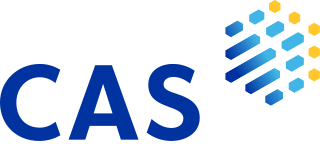
A book is a medium for recording information in the form of writing or images. Modern books are typically in codex format, composed of many pages that are bound together and protected by a cover; they were preceded by several earlier formats, including the scroll and the tablet. The book publishing process is the series of steps involved in their creation and dissemination.

The International Standard Book Number (ISBN) is a numeric commercial book identifier that is intended to be unique. Publishers purchase or receive ISBNs from an affiliate of the International ISBN Agency.

An International Standard Serial Number (ISSN) is an eight-digit serial number used to uniquely identify a serial publication (periodical), such as a magazine. The ISSN is especially helpful in distinguishing between serials with the same title. ISSNs are used in ordering, cataloging, interlibrary loans, and other practices in connection with serial literature.

The National Library of Sweden is Sweden's national library. It collects and preserves all domestic printed and audio-visual materials in Swedish, as well as content with Swedish association published abroad. Being a research library, it also has major collections of literature in other languages.

A digital object identifier (DOI) is a persistent identifier or handle used to uniquely identify various objects, standardized by the International Organization for Standardization (ISO). DOIs are an implementation of the Handle System; they also fit within the URI system. They are widely used to identify academic, professional, and government information, such as journal articles, research reports, data sets, and official publications.

Chemical Abstracts Service (CAS) is a division of the American Chemical Society. It is a source of chemical information and is located in Columbus, Ohio, United States.

The International Standard Music Number or ISMN is a thirteen-character alphanumeric identifier for printed music developed by ISO.
A bestseller is a book or other media noted for its top selling status, with bestseller lists published by newspapers, magazines, and book store chains. Some lists are broken down into classifications and specialties. An author may also be referred to as a bestseller if their work often appears in a list. Well-known bestseller lists in the U.S. are published by Publishers Weekly, USA Today, The New York Times, and IndieBound. The New York Times tracks book sales from national and independent bookstores, as well as sales from major internet retailers such as Amazon.com and Barnes & Noble.
A technical report is a document that describes the process, progress, or results of technical or scientific research or the state of a technical or scientific research problem. It might also include recommendations and conclusions of the research. Unlike other scientific literature, such as scientific journals and the proceedings of some academic conferences, technical reports rarely undergo comprehensive independent peer review before publication. They may be considered as grey literature. Where there is a review process, it is often limited to within the originating organization. Similarly, there are no formal publishing procedures for such reports, except where established locally.

The German National Library is the central archival library and national bibliographic centre for the Federal Republic of Germany. It is one of the largest libraries in the world. Its task is to collect, permanently archive, comprehensively document and record bibliographically all German and German-language publications since 1913, foreign publications about Germany, translations of German works, and the works of German-speaking emigrants published abroad between 1933 and 1945, and to make them available to the public. The DNB is also responsible for the Deutsche Nationalbibliografie and several special collections like the Deutsches Exilarchiv 1933–1945, Anne-Frank-Shoah-Bibliothek and the Deutsches Buch- und Schriftmuseum. The German National Library maintains co-operative external relations on a national and international level. For example, it is the leading partner in developing and maintaining bibliographic rules and standards in Germany and plays a significant role in the development of international library standards. The cooperation with publishers has been regulated by law since 1935 for the Deutsche Bücherei Leipzig and since 1969 for the Deutsche Bibliothek Frankfurt am Main.

Open Library is an online project intended to create "one web page for every book ever published". Created by Aaron Swartz, Brewster Kahle, Alexis Rossi, Anand Chitipothu, and Rebecca Malamud, Open Library is a project of the Internet Archive, a nonprofit organization. It has been funded in part by grants from the California State Library and the Kahle/Austin Foundation. Open Library provides online digital copies in multiple formats, created from images of many public domain, out-of-print, and in-print books.
"Bookland" is the informal name for the Unique Country Code (UCC) prefix allocated in the 1980s for European Article Number (EAN) identifiers of published books, regardless of country of origin, so that the EAN namespace can catalogue books by ISBN rather than maintaining a redundant parallel numbering system. In other words, Bookland is a fictitious country that exists solely in EAN for the purposes of non-geographically cataloguing books in the otherwise geographically keyed EAN coding system.
The Roud Folk Song Index is a database of around 250,000 references to nearly 25,000 songs collected from oral tradition in the English language from all over the world. It is compiled by Steve Roud. Roud's Index is a combination of the Broadside Index and a "field-recording index" compiled by Roud. It subsumes all the previous printed sources known to Francis James Child and includes recordings from 1900 to 1975. Until early 2006, the index was available by a CD subscription; now it can be found online on the Vaughan Williams Memorial Library website, maintained by the English Folk Dance and Song Society (EFDSS). A partial list is also available at List of folk songs by Roud number.
R. R. Bowker LLC is an American limited liability company domiciled under Delaware Limited Liability Company Law and based in Chatham, New Jersey. Among other things, Bowker provides bibliographic information on published works to the book trade, including publishers, booksellers, libraries, and individuals; its roots in the industry trace back to 1868. Bowker is the exclusive U.S. agent for issuing International Standard Book Numbers (ISBNs). Bowker is the publisher of Books in Print and other compilations of information about books and periodical titles. It provides supply chain services and analytical tools to the book publishing industry. Bowker is headquartered in Chatham, New Jersey, with additional operational offices in England and Australia. It is now owned by Cambridge Information Group.

The National Library of Luxembourg, abbreviated as BnL, is Luxembourg's national library. It was founded in its current form in 1899, as a result of a series of different institutions originating in the 18th century. It is located in the Kirchberg district of Luxembourg City. The BnL is a public establishment under the supervision of the Ministry of Culture.

The National Library of Estonia is a national public institution in Estonia, which operates pursuant to the National Library of Estonia Act. It was established as the parliamentary library of Estonia on December 21, 1918.
Chinese publishing and printing industry have a long history. The first printed book sold commercially was sold in the markets of Tang dynasty China in 762, while printed paper receipts used for business transactions and tax payments can be dated to 782. The Chinese publishing industry continues to grow in modern times. In 2004, China published 25.77 billion copies of national-level and provincial-level newspapers, 2.69 billion magazines, and 6.44 billion books.

The Kenya National Library Service (KNLS) is a corporate body of the Kenyan government with a mandate to "promote, establish, equip, manage, maintain and develop libraries in Kenya". In its service provision, knls plays a dual role of Public Library and National library of Kenya.

The International Standard Name Identifier (ISNI) is an identifier system for uniquely identifying the public identities of contributors to media content such as books, television programmes, and newspaper articles. Such an identifier consists of 16 digits. It can optionally be displayed as divided into four blocks.

Books in the United Kingdom have been studied from a variety of cultural, economic, political, and social angles since the formation of the Bibliographical Society in 1892 and since the History of books became an acknowledged academic discipline in the 1980s. Books are understood as "written or printed work consisting of pages glued or sewn together along one side and bound in covers".













